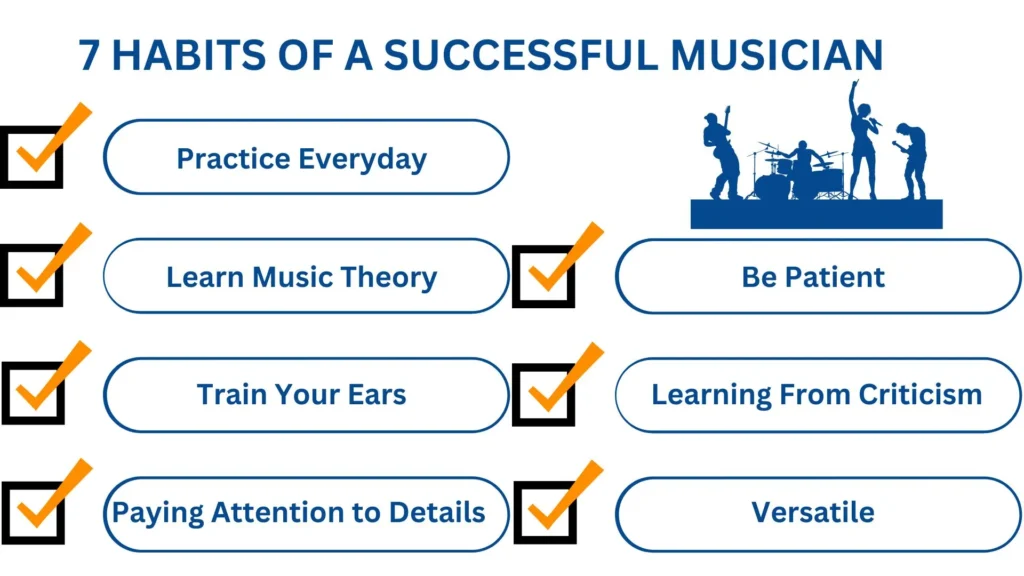The music industry is known for its tough competition and saturated market, making it difficult to carve out a long-term career. Some people make it, while others don’t.
It’s not a random process; there are certain habits of successful musicians that make them stand out in the music industry.
Do you aspire to become a successful musician? It takes work to make it. However, in this blog, I will unveil the 7 famous musician habits which will help you learn how to be a successful musician.
Table of Contents
7 Habits of a Successful Musician
Do you want to know how to be a successful musician? Well, here are the 7 common habits of successful musicians you can develop to become famous and successful.

1. Practice Everyday
The rhythmic heartbeat of success in music is practice, practice, and practice! As the saying goes, “Practice makes perfect.” How? Here are some reasons that show daily practice is one of the common habits of a successful musician.
I. Muscle Memory
Repetition is the mother of mastery. Daily practice ingrains movements and patterns into muscle memory, allowing musicians to perform with fluidity and ease.
II. Discipline
The daily practice cultivates discipline and resilience. It requires commitment and dedication, even on days when motivation wanes.
Also, explore important healthy habits for the new year to improve your discipline.
III. Skill refinement
Skill refinement is one of the daily habits of a successful musician. Think of daily practice as sharpening a blade. Each session hones the musician’s skills, refining their technique, timing, and expression.
IV. Feedback and Growth
Daily practice provides opportunities for self-assessment and growth. One of the best cellists of the twentieth century, Pablo Casals, was reportedly asked: “Why do you still practice six hours a day?” He said, “Because I think I’m making progress.”
You can break the habit of being yourself to grow your identity by self-assessment.
10,000 hours rule
This rule was coined by psychologist Anders Ericsson and popularized by Malcolm Gladwell. According to the 10,000-hour rule, proficiency in any profession needs around 10,000 hours of dedicated practice.
While the number is not a strict rule, it emphasizes the importance of sustained effort and focused practice in skill development.
According to this idea, if you practice for an hour every day, it will take you about 27 years to perfect your instrument completely. That’s why rehearsing for several hours each day is one of the common habits of successful musicians.
2. Learn Music Theory
There is a common misconception that mastering music theory is detrimental to one’s creativity, affecting both playing and composition skills.
The logic for this idea is that music theory compels musicians to adhere to musical rules that can limit creative expression despite the fact that music is supposed to be a free-spirited and unconstrained form of art.
The truth is that music theory serves as the backbone of musical understanding, providing a framework for musicians to analyze, compose, and perform with depth and precision.
Learning music theory is the habit of famous musicians. It includes a wide variety of the fundamentals of notes and scales to advanced harmonic structures and compositional techniques.
Why is it Important to Understand Music Theory?
There are multiple benefits to understanding of music theory;
- Music theory serves as the language of music. It provides you with a systematic approach to understanding the structure and organization of music, enabling you to communicate and interpret musical ideas effectively.
- Whether you’re a singer, instrumentalist, composer, or producer, a thorough understanding of music theory is needed to navigate the complexities of the musical landscape.
- For composers and songwriters, music theory serves as a valuable tool for crafting original compositions.
- Studying music theory trains musicians to listen attentively and analytically to various musical works.
Music theory is a fundamental aspect of successful musician habits. By mastering the principles and concepts of music theory, musicians can enhance their creativity, communication, and expression and achieve excellence in their craft.
3. Train Your Ears
Have you ever encountered someone who can play a song after hearing it only once? Or who can tune a guitar by ear?
Imagine a painter who can’t see colours or a chef who can’t taste ingredients. Similarly, for a musician, the ability to truly listen is paramount. Training their ears is an important habit of a successful musician.
Successful musicians understand that their ears are their most valuable tool. They listen not only to music but to the nuances within it, the timbre of instruments, the dynamics, and the interplay of harmonies.
We sometimes ascribe these abilities to possessing “perfect pitch,” a phenomenon in which around one in every 10,000 people can recognize or recreate a specific musical note without using a reference tone. However, even without a perfect pitch, many people can achieve these things. It just requires some ear training.
Just like building an exercise habit in the gym, training your ears requires consistent practice. It’s about sharpening your auditory senses to discern pitch, rhythm, and tonality with precision. Whether it’s through
I. Ear Training Exercises
There’s a plethora of exercises to challenge and improve your ear acuity. These exercises not only enhance your ability to recognize musical patterns but also deepen your understanding of music theory, empowering you to express yourself more fluently through your instrument.
II. Transcribing Music by Ear
Transcribing music by ear is a habit of famous musicians, similar to deciphering a musical code. It involves listening to a piece of music and notating it accurately, whether it’s a melody, a chord progression, or a complex solo.
IV. Close Attention to the Sound
Successful musicians approach listening with intentionality. They immerse themselves in a wide variety of musical genres.
Every moment spent honing your listening skills is an investment in your musicality.
4. Paying Attention to Details
Paying attention to the details is one of the most important habits of a successful musician.
It is more than a habit; it is a mindset. Successful musicians understand the importance of paying attention to details in their craft. From the subtle nuances of phrasing to the precise articulation of notes, it’s the small details that elevate a performance from good to extraordinary.
Famous musicians are rarely content with “good enough.” Instead of settling, they’re always striving for perfection. You’ll often hear them say, “It’s good, but it can be better,” or “Something’s missing; let’s keep working.”
They approach their job with an unwavering commitment to perfection, continually seeking to improve their talents and push their performances to new levels. They recognize that brilliance is found in the smallest of details, and they welcome the challenge of mastering every aspect of their craft.
5. Be Patient
If you are enthusiastic about how to be a successful musician, then patience is the key. Successful musicians understand that mastery doesn’t happen overnight. It requires numerous hours of practice, repetition, and refinement to develop their skills to a high level.
Patience allows them to embrace the process, understanding that progress comes gradually with consistent effort.
Patience is the antidote to frustration. Instead of becoming discouraged by setbacks, successful musicians approach challenges with resilience and perseverance. They understand that setbacks are opportunities for growth and learning, and they remain patient as they navigate through them.
Patience is one of the key habits of a successful musician. They understand that progress may be slow at times, but every step forward brings them closer to their goals.
I. Not Chasing Quick Wins in the Music Industry
We live in a world that values instant gratification. Everyone wants to accomplish their goals as fast as possible. Successful musicians understand that building a sustainable career in the music industry is not about quick wins but long-term success. They prioritize longevity over fleeting fame.
- Quick wins often come at the expense of authenticity and originality.
- Quick wins can often lead to a false sense of security or an inflated ego.
Successful musicians remain grounded, regardless of their level of success. Not chasing quick wins in the music industry is one of the common habits of successful musicians.
They understand that humility and gratitude are essential qualities that not only endear them to their fans but also keep them grounded in reality.
6. Learning from Criticism
If you want to develop successful musician habits, then learn from criticism. The music industry is a competitive one. It’s never easy to deal with criticism in any industry, but it feels especially personal when it comes to the music industry.
Successful musicians view criticism as an opportunity for growth rather than a setback. They realize that feedback, whether positive or negative, provides essential insights into their work.
How do we Deal with Criticism?
- Instead of shying away from criticism, embrace it with an open mind and a willingness to learn.
- You are recognizing that it can assist you in identifying areas for development and refining your skills, just like the habits of successful SNHU students.
- It offers a fresh perspective on your work, allowing you to see your music through the eyes of others.
- Learn to separate constructive criticism from destructive.
- Use the constructive as fuel for growth and the latter as motivation to prove your critics wrong.
Criticism catalyzes refinement. Successful musicians develop resilience in the face of criticism, understanding that it’s not personal but a part of the journey towards improvement.
7. Versatile
Versatility is more than just a skill; it’s a habit of successful musicians that sets them apart in the ever-evolving landscape of the music industry.
In the fast-paced world of music, versatility is synonymous with adaptability. Successful musicians embrace change with open arms, seizing opportunities for growth and evolution.
They understand that the music industry is constantly evolving, and versatility is the key to staying relevant and thriving in an ever-changing landscape.
- Versatility opens doors to new creative possibilities and helps you to reach a wider audience.
- It shines brightest on stage, where successful musicians effortlessly adapt to different performance settings and audiences.
- Collaboration is key to musical versatility. Collaboration encourages creativity and innovation.
Versatility is not just a famous musician’s habit but a mindset that propels musicians to new heights of creativity, collaboration, and innovation.
How can Musicians Leverage Social Media to Promote their Music?
Musicians can leverage social media in various ways to effectively promote their music and engage with their audience. They can utilize platforms like Instagram, Facebook, Twitter, and TikTok to share updates about their music, upcoming releases, and performances.
Posting behind-the-scenes glimpses, studio sessions, and rehearsal footage can create anticipation and excitement among followers. Using social media is also a good habit of successful musicians as social media provides an exciting opportunity for musicians to display their skills, engage with fans, and expand their following.
Conclusion
In a nutshell, it’s clear that successful musicians aren’t just talented; they’re dedicated, resilient, and always striving for improvement. They practice regularly, pay close attention to details, stay patient and humble, and are always open to learning; these habits form the foundation of their success. Embracing only a few of these habits of a successful musician will help you become a musical sensation.




